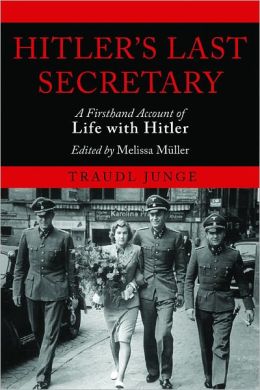Christmas time meant time to read - and history is always a favorite. The movie Downfall recreates those last crazy days of a desperate and now paranoid dictator. It is inconceivable from our cultural background to view the fanatical loyalties of an intelligent culture that would anesthetize their own conscience to perform unthinkable requests.
Goebbels, hitler's propaganda minister and his wife are so fanatical, that they take their own family of six young children under 13 years of age and would rather poison them in the bunker complex than face the possibility of of raising them in a world without Nazi politics in charge of the country.
 Heinz Linge, Hitler's Valet of ten years, lays out his memoirs of ten years with the Führer. With Hitler to the End brought me new information:
Heinz Linge, Hitler's Valet of ten years, lays out his memoirs of ten years with the Führer. With Hitler to the End brought me new information:
- Hitler fathered a son in France during WWI - born in 1918
- There were a series of Head Quarter bunkers in western Germany - to be nearer the Western front, not just eastern Germany - where critical decisions were made about the eastern front with Russia were made. It was in the eastern front that von Stauffenberger planted the bomb in the failed assassination attempt on Hitler in July 1944. That attempt was just weeks following the invasion at Normandy. I did not know about the western bunkers.
- Hitler came to those bunkers one last time for two weeks to command the Battle of the Bulge. On January 16, 1945 he went to the bunkers in Berlin never to leave again.
- Hitler's health and physical well-being deteriorated at the end following the defeat at Stalingrad - that is when the tremors on his left side began, not as a result of the July '44 assassination attempt.
Linge records this anecdote:
"His moustache was often a clue to his mood. If he was sucking it, this was always a warning for us."

“Not until the middle of the 1960s did I gradually and seriously begin to confront my past and my growing sense of guilt. Over the last thirty-five years that confrontation has become an increasingly painful process: an exhausting attempt to understand myself and my motivation at the time. I have learned to admit that in 1942, when I was twenty-two and eager for adventure, I was fascinated by Adolf Hitler, thought him an agreeable employer, paternal and friendly, and deliberately ignored the warning voice inside me, although I heard it clearly enough.”
The absolute arrogance and abasing self-confidence of Hitler was so over the top, that it was ludicrous. Judge records the following exchange:
“Eva Braun took a lot of trouble to amuse the Führer. Once she tried to draw the photographer Walter Frentz and her friend Herta into a conversation about new films.
Hitler began quietly whistling a tune.
Eva Braun said, ‘You’re not whistling that properly, it goes like this.’ And she whistled the real tune.
‘No, no, I’m right,’ said the Führer
‘I bet you I’m right,’ she replied.
‘You know I never bet against you because I’ll have to pay in any case,’ said Hitler. ‘If I win I must be magnanimous and refuse to take my winnings, and if she wins I have to pay her,’ he explained to the rest of us.
‘Then let’s play the record and you’ll see,’ suggested Eva Braun.
Albert Bormann was the adjutant on duty. He rose and put the record in question – I forget what it was -on the gramophone. We all listened hard and intently, and Eva Braun turned out to be right. She was triumphant.
‘Yes,’ said Hitler. ‘So you were right, but the composer composed it wrong. If he’d been as musical as me then he’d have composed my tune.’
We all laughed, but I do believe Hitler meant it seriously.”
Linge died in 1980and Junge died in 2002.
What I missed in both volumes was any insight into leadership thinking or anecdotes following the landing of Normandy in June of 1944. The critical shift in the war was completely left out of the narrative in both books. Interesting.
To be honest, this dark side of our history reveals a trait of German psyche that is a cultural trait. At the same time, when focused on Jesus, the same loyalty and intense faithfulness can be witnessed. I love to see people radically changed and charged to follow Christ.